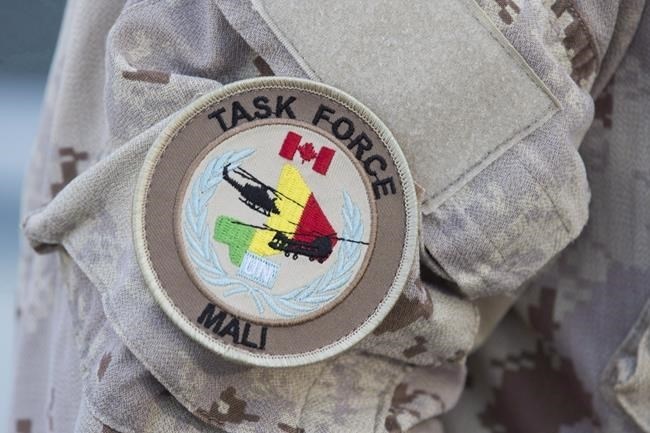
The UN Mali patch is shown on a Canadian forces member's uniform before boarding a plane at CFB Trenton in Trenton, Ont., on July 5, 2018. In a sobering new report, the head of United Nations says the security situation in Mali has sharply deteriorated over the past three months while the need for more foreign aid to help provide food and other urgent humanitarian assistance has skyrocketed.
Image Credit: THE CANADIAN PRESS/Lars Hagberg
October 11, 2018 - 6:00 AM
OTTAWA - In a sobering new report, the head of the United Nations says the security situation in Mali has sharply deteriorated over the past three months even as demand for more food aid and other humanitarian assistance has skyrocketed.
The assessment by UN Secretary General Antonio Guterres coincides with the presence of Canadian peacekeepers in Mali, and suggests the country is in many ways worse off now than when they first arrived in June.
Not that there haven't been some hopeful signs, including successful presidential elections in July and August and a marked decline in the number of peacekeepers killed or wounded despite continuing attacks by armed groups.
That is reflected in the fact that while the Canadian military's primary task in Mali is to evacuate injured UN peacekeepers by helicopter, they have so far only conducted two such missions, both on Sept. 11.
Guterres nonetheless painted a picture of a country at war with itself as various ethnic and extremist groups targeted each other as well as the Malian military, international forces and even civilians.
The result was the largest number of civilians killed — 287 — in one three-month period since UN peacekeepers first arrived in the country in 2013, while thousands more have been forced to flee their homes to escape the violence.
Much of the fighting was between members of two different ethnic communities in the centre of the country, while groups linked to al-Qaida and the Islamic State were also responsible for a great deal of violence.
"Intercommunal conflict, exacerbated by violent extremist groups, is fraying an already fragile social fabric and is deeply concerning," Guterres wrote. "Too high a human toll has accrued as a result of the ongoing spiral of violence."
The number of human-rights violations in Mali, which was already troublingly high, was similarly worse because of hundreds of new extrajudicial killings, disappearances, tortures and rapes across different parts of the country.
While most of those atrocities were perpetrated by the Islamic groups and competing ethnic communities, the Malian military itself was implicated in 18 violations — including one mass killing that is being criminally investigated.
"The human rights situation is alarming," Guterres wrote. "It is absolutely imperative that the government prevent human rights violations and abuses, including those committed by the Malian armed forces."
Further adding to Malians' woes were severe floods in some areas and drought in others that, when combined with the fighting, had doubled the number of internally displaced people and left one in four needing humanitarian aid.
"The level of needs of is higher than at any point since the beginning of the crisis in 2012," Guterres wrote.
The country was plunged into turmoil after a rebellion in the north at the same time as the Malian military was staging a coup in the capital, Bamako.
Canadian peacekeepers recently helped the World Food Programme deliver more than two tonnes of food, water and medicine by helicopter to a village in central Mali.
Yet despite the growing need for more emergency aid, Guterres reported that only one-third of the roughly $400 million needed to help Malians had been provided to the UN by the beginning of September.
"While needs continue to increase, humanitarian funding has decreased, preventing a timely at-scale and appropriate response," he wrote.
Canada has provided funding for various development projects and agencies in Mali, but Bruno Charbonneau, an expert on Mali at Laurentian University, said the $60 million in emergency aid given since 2012 is relatively small.
Most of that money was also pledged immediately after the rebellion in the north and the coup.
As for the bigger picture, Charbonneau said what is needed is more international focus on the centre of Mali and greater emphasis on development to tackle the root causes of the conflict.
"As long as the focus is on countering terrorism in the Sahel, everything else is secondary," he said. "And I think it's a bad reading of the situation based on assumptions about the dynamics of the conflict and its causes."
— Follow @leeberthiaume on Twitter.
News from © The Canadian Press, 2018